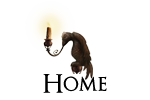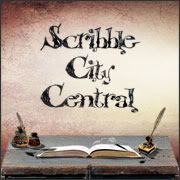Peter Dickinson is, quite simply, one of the greatest writers of children's books there has ever been and probably ever will be. I can find no other way of putting it, and if anyone tells me I am exaggerating, I will be delighted to duel them at dawn. That's how strongly I feel about the matter! So when I asked (in hopefulness rather than in expectation) if Peter would do a short Mythic Interview, and he said yes, well...quite frankly I did a jig of delight and joy around the kitchen, whooping and yelling in a way very unbefitting to a woman of my girth and advancing middle years. Obviously, I dashed immediately to my bookshelves for an orgy of Dickinson re-reading, and it strikes me that the process of reading Peter's work is an excellent education for any writer, whether of children's books or not. Not only can the man tell a story which keeps you up far into the night, but the richness and depth of his language--the way he puts words together in a way that makes you say 'yes--that's how it IS (except that I never knew it quite like THIS before)' is nothing short of miraculous. I expect you're now going to ask me which is my favourite of his many books. It's so hard to pick just one. Right now it would probably be The Blue Hawk (for which he won the Guardian Award in 1977). Meeting Tron the Goat-chosen again made me feel the soul of the hot desert sand under my feet, made me tremble at the terrible, inexorable chanting of the priests of O and Aa, caught me entirely in the soaring webs of godpower and magic and sheer tale-telling mastery Peter wove over 30 years ago. Reader, I was entranced! But perhaps YOU might think I should have chosen Tulku, or The Kin, or Changes or The Tears of the Salamander or Angel Isle or the Ropemaker--the latter two quite newly-discovered loves of mine? I'm sure lots of you will have your own favourites, and I'd very much like to hear about what you'd choose of Peter's oeuvre--and why--in the comments underneath.
The most recent of Peter's books is Fire: Tales of Elemental Spirits--a collection of short stories he has written jointly with his wife, the marvellous Robin McKinley (who will, I hope, be sharing her own mythic musings with us later in the series). As with the previous book, Water, I enjoyed both their contributions immensely. There's a story in there--one of Peter's--called Phoenix. It is set, mostly, in a wood. Now I have spent a lot of time in woods and this particular one is perfectly and carefully observed. The way Peter has woven the myth of the phoenix right into the deep heart of the English landscape so that it seems entirely natural there, is quite remarkable. It's a story I keep thinking about, over and over, because often, when someone else writes about a thing you love greatly and know well (as I do woods), it is disappointing. In this case, I am left with the comfortable and comforting sense that 'my' woods (or at least my heart's ideas about and memories of what woods should be) are safe--are preserved forever--in Peter's exquisitely imagined words. I can pay him no greater compliment than that. And now, I want to hand you over to Peter himself. I am so glad and honoured that (despite being very unwell earlier in the year) he is here with us all at Scribble City Central--and I am sure you will agree that his mythic answers are admirably informative, succinct and to the point. I quite agree with him about the dragons, by the way. Dragons are tricky, intelligent and dangerous beasts--which should always be treated with respect. His answer to question 7 made me laugh a lot. He's quite right, of course. Who'd be a demigod, given their track records? Here he is:
1. Do you think that the retelling of myths is important or relevant for the children of today? Why should they care about some “dry old stories” which come from ancient or forgotten cultures they might never even have heard of?
If a myth is retold as a dry old story it will die. If it is told because it seems to embody, however remotely, some truth or belief that is important to our society, or simply to us as humans, it will survive. When someone talks about “the Dunkirk spirit” they are treating the event as myth, helping to keep alive a part of an unformulated belief of what it means to be British. “When Pearse summoned Cuchulain to his side/ What stalked through the Post Office?” Same sort of thing.
2. What age were you when you came across your first myth or myths? Tell us how you felt then about the myths you first discovered. Did you love them or hate them? Did they scare you, excite you—or were you indifferent? What kind of myths were they? Greek? Norse? Native American? Celtic? Or from another culture entirely? Were they in a book you read? Or did you hear them as oral storytelling from someone else?
I don’t think I distinguished myth from story much until somebody told me about the death of Baldur, and presumably told me what it was about. I don’t think I actually hated anything because it was a myth. I remember liking Perseus and Andromeda because I thought winged sandals were really cool, and using them to swoop down and slay the dragon and rescue the girl (I don’t think she was wearing much in the illustration) excited the young male mind. But really it’s just a story. It’s lost its function as a myth if it ever had one.
3. Looking back, what is your favourite myth of all time, from any culture? And why would you choose it?
Oedipus. Terrific story about the sheer inexorability of fate
4. Who is the mythical hero, heroine or being you most dislike, and what made you feel that way about them?
Achilles, Siegfried, all those ultra-masculine bully-boys.
5. Is there a mythical beast you are particularly fond of? If so, which one?
No, but I particularly dislike cute dragons.
6. How have myths had an influence on your writing life, if at all?
Of course they have, but too vaguely to discuss. They’re just part of the mix, along with King James’s Bible and trashy adventure stories and SF magazines, etc
7. If you could choose to be the demigod child of any one mythical god or goddess, which one would it be? Which power would you like to inherit from them—and what would you do with it?
No thanks. Nightmare scenario. Do you know of any divine by-blow who had a good time? Mostly they ended up as shrubs or rivers or constellations or something.
More about Peter:
Born 1927 in what is now Zambia. Father, British colonial civil servant; mother from South African farming family. Three brothers – he’s the second. Family returned to England when he was 7, but his father died the same year. Very little money, but he was privately educated at boarding schools, thanks to generosity of relatives. Scholarship to Eton. Briefly conscript in British army just after World War 2. Then Cambridge University, then 17 years working for the British humour magazine, Punch. Published his first two books, an adult detective story and a children’s SF adventure, in 1968, and from then on has been a full-time writer. Has been nine times on the Carnegie Medal short list and won it twice, as well as other major prizes. In l952 married his first wife, and they had two daughters and two sons. He now has six grandchildren. His first wife died in 1988, and two years later he married Robin McKinley. They live in a small Hampshire town with a couple of lurchers.
Friday, 2 July 2010
Mythic Friday Interview: Number 14 - Peter Dickinson
Subscribe to:
Post Comments (Atom)

















25 comments:
Excellent interview and completely agree with him on No.4!
Oh my - time for me to rediscover Dickinson I think - great interview, really made me smile - Winged Sandals are SO cool..and he's so right, who wants to end up a shrub? Oh smiling again - thanks for this Lucy!
Tulku is one of those books that gripped me, at first because of the adventure, but subsequent readings over many years, made me love the amazing, beautifully inhabited characters. And as I am into gardening, the plant collecting element, especially lilies, enchanted me. It remains my favourite book. I agree about Blue Hawk. I reread it last year and was swept into the emotions immediately. More recently, The Tears of the Salamander has become a favourite. Peter Dickinson's extraordinary worlds are masterly and I think he is a national treasure.
Thanks for kicking off the comments, Sarwat and Kathryn. Yes, winged sandals--I can't tell you how much I wanted a pair when I was a child (and still do, really).
Joyce--national treasure is right! I agree about Tears of the S--and v topical, given the volcano trouble we've been having. Peter's knowledge and love of plants shines through much of his writing--he is keen on his garden, and it shows!
Lovely to read this, Lucy and Peter! I'm sure he won't remember, but I did a profile of Peter for the TES a million years ago and made a reference to his "horsey beauty" which the Literary editor Michael Church, made me cut! But I stand by my opinion.
I love so many of his books but had a very soft spot for The Dancing Bear. The Kin was amazing and miraculous.Great news about the Elementals! Must get the Fire one.
Scandalous about Puffin. He deserves better treatment - how short are the memories of people who compile such lists. He was also shortlisted to be first Children's Laureate but that probably came a bit late for him.
I'm thrilled that we share the death of Baldur as our first remembered myth and I hate cute dragons too - and cute unicorns as much.
Now that I can stop reading Booktrust books for a bit I shall indulge in a Dickinson binge soon after my Diana Wynne Jones binge. How lucky we are to have the great and prolific output of both of them.
I look forward to Robin's mythic interview too.Thank you.
Thanks for the interview. And I want some winged sandals, too...
Oh this is brilliant - thanks to both of you! I love the answer to No 7 (though I'm thinking it's a great pity I can't turn several people of my acquaintance into shrubs...)
I'm now off to discover more of Peter Dicksonson because somewhere, down here, in the southern depths of Africa, I appear to have missed out almost completely - aside from The Tears of the Salamander which I loved!
Do they do winged sandals in size six, wide fitting, please? Great interview: sometimes I think the press is so busy chasing bright young things that they forget about the high quality and craftsmanship of the bright. . . well. . .um. . . older things!
A lovely interview, displaying a mind still fresh and alive. One can imagine his tone of voice! I hate the bully boy heroes too.
"shrubs" --hee hee.
Thanks for the great interview, both of you!
Some people are having trouble commenting because of technical issues with Blogger. If you are having a problem, please do email me, and I will post it for you. Here's one from Jane Eagland:
"How marvellous to hear from you, Peter. Early in my teaching career I admired your books for their fine writing and recommended them to my pupils. Catching up with you again after all this time is lovely and has made me want to go back and re-visit the books. Shame on Puffin! Incidentally I was in America recently and noticed that they keep re-issuing old favourites including some books I enjoyed as a child. English publishers' obsession with novelty is to be regretted
Thanks Lucy for this treat!
Jane"
Mary--I'm not sure what Robin will say about your comment--but I too think Peter has a most wonderful face. As for Puffin--they should be ashamed of themselves indeed, and I hope someone from there is reading this and will realise their error.
Nicky--yes, I too can think of shrub candidates. Many of them.
And as for those winged sandals--I'm first in the queue, people.
As a long term Peter Dickinson fan, it was a great pleasure to read this interview. My favourites are "The Seventh Raven" and "A Box of Nothing": the phrase, "the Dump has ceaed to function" became a family byword for quite a while.
What a treat to see this interview! I agree with you, Lucy, that he's one of the very greats and I love especially his adult thrillers. And The Blue Hawk, and one thing I have never forgotten was a brilliant article called In defence of rubbish which said something like (not in these words, obviously!) "Anyone who hasn't spent the whole of a summer holiday lying on a bed and reading last year's comics hasn't lived."
Way to go, Peter...good health and good fortune to you. And thanks, Lucy!
I loved THE KIN! I have a copy on my shelf still, and think this book really demonstrates Peter Dickinson's power to transport the reader to another world. Sometimes we need other worlds in order to make sense of this one...
beautiful interview! love his last answer and he's right - no demi-god half-spawn had a good life. I'm sure that says something about our own perceptions of greed or gluttony.
Wonderful interview on such a prolific writer!
Peter Dickinson is another instance of how easy it is to miss 'older' British writers when you haven't grown up here. I know my son read some, but I never stopped to think twice about it. Silly me.
Great interview - it was especially gratifying to read the answer to #5, I couldn't agree more
What an honor to read an interview with Mr. Dickinson. Thank you, Lucy, for the lovely interview!
Do you know, I've never read The Seventh Raven, Kath. How remiss of me--must be one I've missed out on. I shall seek it out at once.
Adele-Thank goodness! I think I must have lived life according to Peter. I spent one entire summer learning French by lying on my bed deciphering Asterix and Lucky Luke comic books.
Ketherine--absolutely. I find I use other worlds--even ones very close to ours, such as Gillian Philips' one in 'Bad Faith'--as a lens to rediscover and see things about our own which I might have forgotten, or to see them from another angle.
Jessie--Peter set me thinking about this, and you have prompted me to think further. I am trying to think of a demi-god who had a life full of nothing but roses, and I can't. Some of them ended up happily (say, Perseus), but the bits leading up to that were ghastly. Mirroring and magnifying the human condition, I suppose, and perhaps in those days it made people's miserable lives better to know that even sons and daughters of gods didn't escape. Served as a warning too to those more fortunate--ie don't push it, hubris will getcha every time!
Bookwitch--you're in for a real treat. It would be wonderful if you could do a retrospective roundup of Peter's books on your blog (says she, cheekily!).
Ann Turnbull wrote:
"It was great to read this, Lucy, and be reminded of all those wonderful books! I loved The Kin, but also have fond memories of many of Peter's much earlier books, such as The Changes trilogy. My husband and I spent a happy half-hour after dinner tonight reminiscing about books of his that we'd loved (Tim remembered one where a chimpanzee was the only witness to a murder...)"
Totally agree about cutey dragons. They really don't count as mythical creatures at all...
Excellent interview. I'll make sure to recommend Mr. Dickinson's work when we get back to school in the fall.
Post a Comment